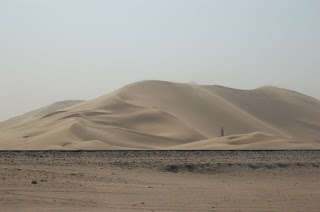
Lauren, Jasmine, Catherine and RuthAnn
Before we departed for our break we headed farther north, to the town of Oshakati. Our experiences there helped show us the differences between city life in Windhoek and the rural north. It was important for us to visit the north as a good majority of the population live there and it served to expand our perspectives on life in Namibia.
Tuesday we visited the Nakambale museum to learn about the beginnings of Christianity in Namibia. The museum was located in the first missionary church in the country and we learned how the church functioned in the beginning with Martti Rautanen, a Finnish missionary. The museum also included a traditional village where we were able to see demonstrations on basket weaving, grinding grain, and making porridge. It seemed almost ironic to learn that with Christianity, traditional lifestyle was minimized, while at the same time it is preserved. We were pleased to see the traditional ways still survive today despite many modern conveniences that exist in urban areas and the historical pressure from the colonizer to abandon them.
Tuesday afternoon we headed further North to Oshikango, an Angolan border post. We were taken back by the amounts of people and economic activity present at the border who used the Export Processing Zone.
Wednesday we made a trip to Ruacana Dam (between Namibia and Angola) where we were able to take in the scenery. This experience was a contrast between the previous trip to the border—with only one border patrolman and a less secure gate into the country. Students in the group enjoyed hiking the dried up falls, and taking pictures along the Angolan border.

Thursday we traveled to the Ongwendiva Rural Development Center where people from the rural areas of Namibia can learn how to sustain themselves through using the land and natural resources. Many things found in nature in the region have a purpose; either to be used as food, seed, or to be sold. This was an unique organization as it was supported by the Namibian Government and it seemed to be teaching sustainable agricultural practices, which was a new encounter for us. Later we visited the Eudofano Women’s Cooperative to learn how the Marula nut is processed into oil. Although it was a smaller organization, it supported large amounts of people (both men and women) and reinforced a global perspective to find they were supplying oil for the International Body Shop.
For many students the highlight of the week was Fridays visit to Osire Refugee Camp. We drove through the camp and had the opportunity to engage in conversation with teachers at the local school who were also refugees. They shared with us about their experiences and their vocations. The refugee camp was different than expected. Arriving at the camp we were pleasantly surprised at the physical conditions, but as more time passed we became increasingly saddened by the circumstances of the refugees—poor food rations, lack of economic activity, internal conflicts, and the red tape around resettlement and repatriation. It was uncomfortable to think that people live in these conditions when we are accustomed to opportunity and prosperity.
This week expanded our knowledge and perspective of life in Namibia. It was fun to be able to learn about and experience rural life.








